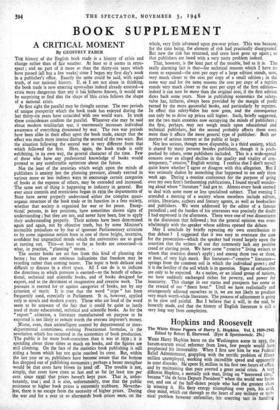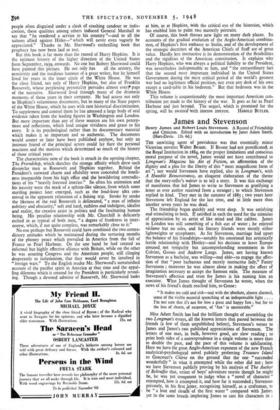Hopkins and Roosevelt
The White House Papers of Harry L. Hopkins. Vol. I. 1939-1942. Edited by Robert E. Sherwood. (Eyre & Spottiswoode. 25s.)
WHEN Harry Hopkins burst on the Washington scene in 1933, the harum-scarum social reformer from Iowa, few people would have prophesied his immortality. When I first saw him he was Federal Relief Administrator, grappling with the terrific problem of fifteen million unemployed, working with incredible speed and apparently in utter disorder. He spent $5 million in his first two hours of office, and by maintaining that pace averted a great social crisis. A very different Hopkins, a mortally sick man, living on " borrowed time," became " the de facto Deputy President " when the world war broke out, and one of the half-dozen people who had the greatest share in winning it. His fiery energy triumphing over pain, his ccid, clear mind, which cut through to the heart of any military or tech- nical problem however unfamiliar, his unerring tact in handling
people often disguised under. a cloak cif crashing candour or indis- cretion, these qualities among others induced General Marshall to say that " he rendered a service to his Country "—and to all the nations allied against Hitler—" which will never even vaguely be appreciated." Thanks to Mr. Sherwood's enthralling book that prophecy has now been laid to rest. But this book is far more than the record of Harry Hopkins. It is the intimate history of the higher direction of the United States from September, 1939, onwards. No one but Robert Sherwood could have painted this picture. He not only has all the artistry, the sensitivity and the insidious humour of a great writer, but he himself lived for years in the inner circle of the White House. He was the close friend, not only of Harry Hopkins, but also of Franklin Roosevelt, whose perplexing personality pervades almost every page of the narrative. Sherwood lived through many of the dramatic moments of those years in their company. He had access not only to Hopkins's voluminous documents, but to many of the State papers of the White House, which he uses with rare historical discrimination. To supplement and control them he has amassed a large body of oral evidence taken from the leading figures in Washington and London. But more important than any of these sources are his own percep- tions and reflections, which lend unique vividness and grace to his story. It is its psychological rather than its documentary material which makes it so important and so authentic. The documents would sooner or later have been published anyhow, but only an intimate friend of the principal actors could lay bare the personal reactions and the motives which determined so much of the history of those critical years. The characteristic note of the book is struck in the opening chapter, The Friendship, which sketches the strange affinity which drew such dissimilar men as Roosevelt and Hopkins together. Behind the President's outward charm and affability were concealed the loneli- ness inseparable from his high office and the bewildering contradic- tions of his " heavily forested interior." So often his animation and Isis jocosity were the mask of a sphinx-like silence, from which some startling project later emerged, such as the lend-lease idea con- ceived in the apparent relaxation of a fishing trip. Stroke by stroke the likeness of the real Roosevelt is delineated, " a man of infinite subtlety and obscurity," soft and hard, ruthless and indulgent, idealist and realist, the creative artist in politics and the fascinating human being. His peculiar relationship with Mr. Churchill is delicately etched in as typical of both men, " a degree of frankness in inter- course, which, if not quite complete, was remarkably close to it." No one perhaps but Roosevelt could have combined the two contra- dictory attitudes which he maintained during the torturing months of the phoney peace which prevailed in America from the fall of France to Pearl Harbour. On the one hand he had created ' an informal but highly effective alliance with Britain, while on the other he was assuring Congress and the American people, still clinging desperately to isolationism, that they would never be involved in "foreign wars." To the English reader Mr. Sherwood's unvarnished account of the pacifist spirit in America at that time and the appal- ling dilemma which it created for the President is particularly reveal- ing. Though a devoted admirer of Roosevelt, Mr. Sherwood looks at him, as at Hopkins, with the critical eye of the historian, which has enabled him to paint two masterly portraits.
Of course, this book throws new light on many dark places. Its accounts of the gradual evolution of the Anglo-American combina- tion, of Hopkins's first embassy to Stalin, and of the development of the strategic doctrines of the American Chiefs of Staff are of great value. Hardly less instructive is its demonstration of the flexibilities and the rigidities of the American constitution. It explains why Harry Hopkins, who was always a political liability to the President, was nevertheless indispensable to him, and " the extraordinary fact that the second most important individual in the United States Government during the most critical period of the world's greatest war had no legitimate official position, nor even any desk of his own except a card-table in his bedroom." But that bedroom was in the White House.
This volume is unquestionably the most important American con- tribution yet made to the history of the war. It goes as far as Pearl Harbour and just beyqud. The sequel, which is promised for the spring, will be awaitedliivith intense interest. HAROLD BUTLER.











































 Previous page
Previous page